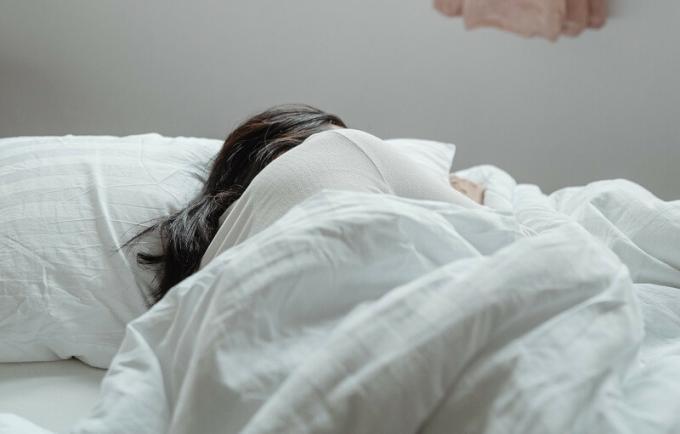Why does insomnia appear and how to combat it?
Sleep is a set of physical and behavioral states.
Sleep duration depends on age, health and emotional status; now, while we sleep, our brain does not rest completely, it remains active controlling our vital functions such as breathing, digestion and circulation, among others. Understanding these processes helps to understand the causes of insomnia.
- Related article: "Top 7 Sleep Disorders"
The stages of sleep
Throughout sleep, changes occur in our brain and body; in this process we go through stages that ensure that our body functions again with its full potential. Thus, throughout sleep, various parts of the brain are activated and inhibited.
Sleep has a circadian biological rhythm and has the REM and Non-Rem phase.
REM sleep comes and goes throughout the night. In her the brain is active, we dream, but the muscles are very relaxed.
In the non-REM phase, the brain is quiet, but the body can move. Hormones are released into the blood and the body repairs itself from the wear and tear of the day.
The non-REM sleep phase consists of four phases: pre-sleep, light sleep, slow wave sleep, and deep slow wave sleep. We went through these phases about five times throughout the night.
On the other hand, during the night we wake up one or two minutes every two hours, although we do not remember it.
Sleep problems affect all spheres of life.
- You may be interested: "The 5 stages of sleep: from slow waves to REM"
sleep needs
The minimum number of hours of sleep we need varies according to age, personal characteristics or circumstances.
- The newborn sleeps most of the day with 50% REM sleep.
- Boys and girls from 4 years old to adolescence need about 10 hours of sleep.
- In young people and adults, the normal duration is from 5 to 9 hours, the ideal being about 7 or 8 hours.
- In old age, nocturnal sleep is considerably reduced, with frequent episodes of awakening.
The insomnia
insomnia is persistent difficulty in initiating sleep, or affecting its duration, consolidation or quality, and that occurs despite the right circumstances to sleep.
More than 50% of patients in primary care complain of insomnia, and the prevalence of insomnia as a symptom of another disease is very high.
The vast majority of the time insomnia is consequence of another underlying disease.
- Related article: "Melatonin: the hormone that controls sleep and seasonal rhythms"
What causes can be behind insomnia?
Insomnia can be classified according to its etiology, its time of onset at night and its duration.
Depending on its etiology, insomnia can be secondary or primary.
- Primary: the patient sleeps badly forever
- Secondary: insomnia appears as a consequence of other clinical pictures.
Examples of health disturbances that lead to secondary insomnia are poor sleep hygiene, insomnia due to psychiatric disorders, insomnia due to chronobiological alterations, insomnia due to medical and neurological diseases, familial fatal insomnia, insomnia due to Restless Leg Syndrome and insomnia due to drugs.
1. Insomnia due to poor sleep hygiene
Harmful habits can disturb sleep. Routines like the absence of schedules, eating at the wrong time, taking exciting substances, consume alcohol or stimulant drugs. Breaking these bad habits usually ends insomnia.
sleep hygiene guidelines
To overcome sleep problems caused by poor sleep hygiene, keep these guidelines in mind:
- Avoid stimulating drinks
- Light dinner
- Exercise
- Avoid long naps
- control medication
- Maintain bedtimes
- Avoid bright light
- Use the bed only to sleep
- Create an ideal environment
- Establish a bedtime ritual

2. Insomnia due to psychiatric disorders
Chronic insomnia is often associated with depression or anxiety, although it is related to psychosis and alcohol and drug dependence.
The depression it causes a shortening of total sleep due to early awakening, and anxiety makes it difficult to start and maintain sleep.
3. Insomnia due to chronobiological alterations
In these cases it occurs an asynchrony of the periods of wakefulness and sleep with respect to the geophysical day/night cycle. In these situations, the causes are:
- phase advance
- phase delay
- Irregular sleep-wake rhythm
- shift work
- jet lag
4. Insomnia due to medical and neurological diseases
This insomnia is related to the symptoms arising from this type of disease: pain, dyspnea, cough, gastroesophageal reflux, nocturia, etc.
Also the treatments given for some diseases can cause insomnia, such as steroids, theophyllines, etc.
5. familial fatal insomnia
This is a prion disease deteriorates the cognitive system rapidly and progressivelyeither. It is hereditary and leads to uncontrolled insomnia.
This disease gives rise to signs of vegetative hyperactivity, tremor, myoclonus, dystonia and pyramidal signs. Death comes in less than two years.
6. Restless legs syndrome
It is the need that gives rise to an irresistible urge to move your legs or walk. It usually appears at night or in the transition from wakefulness to sleep.
It is associated with iron deficiency, peripheral neuropathies or chronic renal failure. Can be treated with dopaminergic agents
